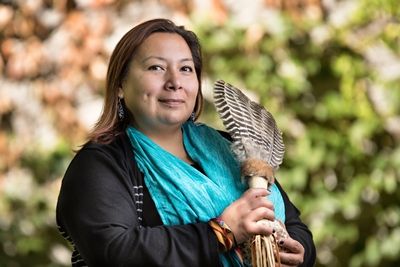
A new Indigenous access and recruitment coordinator hits the road this week on a mission to recruit talented young Aboriginal students to apply to professional programs at Queen’s.
Ann Deer will start her journey in Hamilton, before visiting her alma mater, Trent University, next week. Her new position is a joint effort between Queen’s Law, Medicine and Engineering faculties to expand the pool of qualified Indigenous applicants.
“I am looking for future Indigenous leaders to come to Queens,” she says. “I believe Indigenous people achieving higher education can be the change we seek.”
Even though Deer has only been on the job for a month, she’s off to a good start in pursuit of this goal. “I’ve already received phone calls from people from different provinces expressing interest in the program and wanting to meet with me.”
She says many potential applicants just don’t know all of what Queen’s offers them, and she wants to fill that void. She’s highlighting facilities like the Four Directions Aboriginal Student Centre on Barrie Street, and upcoming events, such as the 18th Annual Indigenous Research Symposium. The symposium, held November 11 and 12, will deal with responses to the Truth and Reconciliation Commission.
“When you compare numbers of Aboriginal students to the number of traditional students, our numbers are very low. “Getting Aboriginal students who have gone to university for their undergrad to think about law school as a possibility – to get them to the next level – is what we want.”
Many potential applicants may not have written the LSAT, or have even been thinking of law school.
“They may not apply this year, but I’m also hoping to reach out and make relationships with people who might be a year away from applying. I can answer questions, invite them to events, possibly connect them with a mentor, keep them updated on any relevant scholarships that they can apply to. Just build that relationship with them, let them know how Queen’s is a community,” Deer says.
Deer is from Akwesasne, the Mohawk community straddling the borders of Quebec, Ontario and New York. She has worked with both young Indigenous students and adult learners during her experience at the Akwesasne Area Management Board and the Akwesasne Mohawk Board of Education.
“I’m Mohawk and I’m from the wolf clan, and I worked for the school board quite a bit. I understand how people learn and how everyone has different learning techniques. So when you come to a big school like Queen’s, there can be a culture shock.”
Even urban Aboriginals, who might not have that problem, “might still want the cultural relevance,” she says.
More generally, Deer says, Indigenous students can acquire skills at law school to better their communities.
“For instance, Akwesasne has the challenge of being a border town. But it’s hard to understand if you don’t live that life every day.”
“If we can get people from those areas to come and learn the law, then they can go back and help their communities with whatever challenges they have, whether its matrimony, land issues, elder abuse, parental rights,” Deer says.
“If you have lawyers from the community who can deal with that, people would feel more comfortable.”
Check our Facebook page to see when Ann Deer will be at a university near you!
By Jeremy Mutton